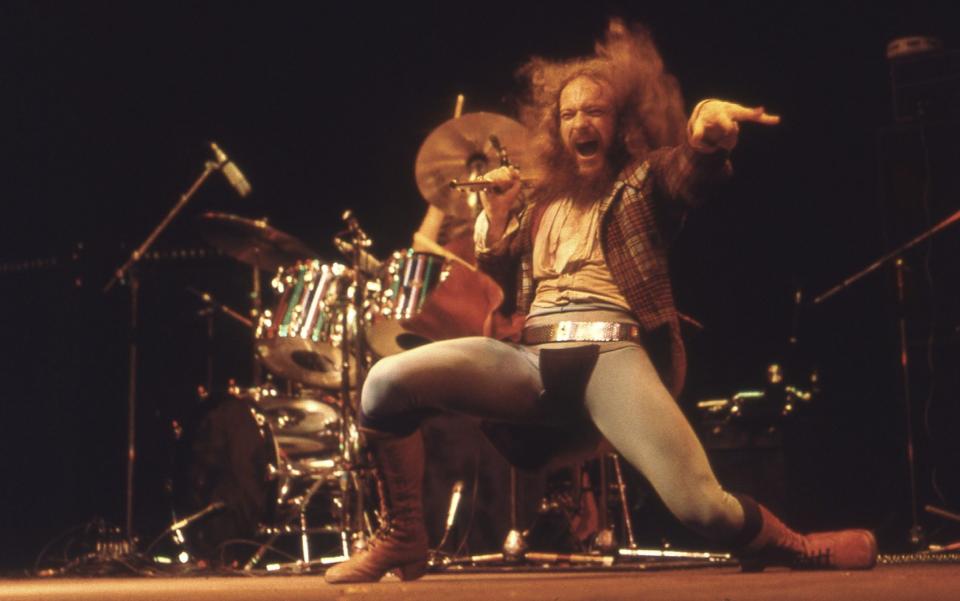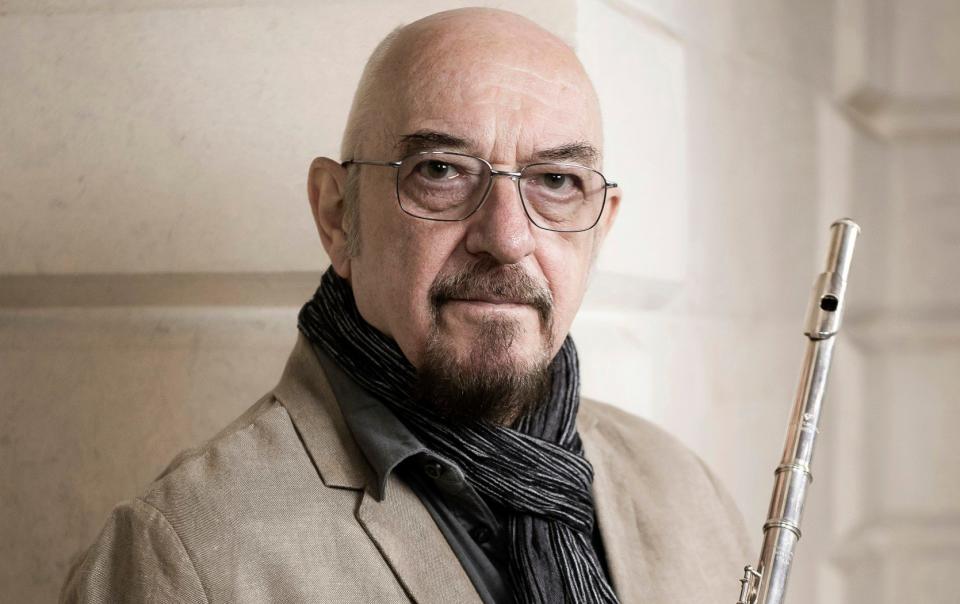Jethro Tull’s Ian Anderson: ‘Nobody could deny I looked great in those tights’

In the annals of pop history, much is made of the moment when David Bowie appeared on Top of the Pops in feather cut and catsuit to sing Starman in 1972. Yet two years earlier, the show had seen a performance perhaps even more wonderfully strange.
It began with a wild-haired creature standing on one leg, playing a delirious flute solo, in frock coat and flares, singing mad-eyed like a demented tree spirit, “Lend me your ear while I call you a foo-oo-oo-oo-oo-oo-oo-oo-ool”. What looked like walrus teeth swung from his crotch. Jethro Tull and their charismatic 22-year-old leader, Ian Anderson, had arrived.
The band were already respected blues practitioners at London’s Marquee Club, which had birthed The Rolling Stones and Fleetwood Mac, but over the next few years they would crack America, sell millions of albums and become synonymous with the sort of vinyl LP, like their brilliant Thick as a Brick (1972), where one track could last a whole side and still be only half the song.
Then came the three-chord wonder of punk rock. “I think the punks thought that they were the triple vaccination that would rid the world forever of the horrible virus of prog rock,” Anderson tells me when we talk on a wintry January morning. “Unfortunately, like in the real world, the virus tends to bounce back in a slightly revived or even re-energised form.”
Doesn’t it just. The Sex Pistols are long gone, but Jethro Tull are about to release their 22nd studio album, The Zealot Gene, their first since 2003. It is clear Tull (though only Anderson remains of the classic line-up), have lost none of their ambition, nor gift for unusual melodies and chord changes.
We’re talking via Zoom, but the dry wit of this Dunfermline native comes across loud and clear. He grew up in Edinburgh, then went to secondary school in Blackpool, before pitching up in Luton during the band’s formative years. After London and global fame, there was a period on the Isle of Skye, where he ran a large salmon farm.
Since the mid-1990s, though, he has been living in an 18th-century manor house, set in a 400-acre estate with 30,000 trees, in rural Wiltshire. Any minute now, he says, his son-in-law, the actor Andrew Lincoln, of This Life and The Walking Dead fame, may appear at the window, “looking quite like [his Walking Dead character] Rick Grimes actually, in shabby outerwear, to take his and our dogs for a walk in the woods. Being a little younger than I am, he’s more up for a spirited walk through the mud.”
It may be an apt time to practise the flute, as Anderson says his dogs run howling when they hear it, yet cats, apparently, enjoy the sound. Anderson developed his own way to play the instrument (“it was technically dreadful”), but he finally bit the bullet and learnt the correct fingering in the early 1990s.
His out-there stage costumes have changed a bit, too. Does he look back and think, “How did I ever wear that?” Or, “I looked pretty good in those tights?” He laughs. “I look back and think, ‘Boy, I really did look good in those tights’. It was just the rest of the stuff that looked silly. I had a really nice pert, taut bum, sort of gently muscular thighs and a very slim build. I looked good in tights. No one could possibly deny that.”
“But that was then and this is now,” he adds. When his old stage gear disappeared from a drawer a while back, his wife of 45 years, Shona Learoyd, denied all knowledge. But then he spotted one of the dustmen wearing a jacket that looked remarkably like one of his. “He was probably wearing my tights and codpiece under his trousers,” he deadpans.
Anderson says he feels blessed to have been young in the 1960s and early 1970s, and to have been part of the music scene of the time. Jethro Tull were close to the epicentre. They appeared in The Rolling Stones Rock and Roll Circus, toured with Led Zeppelin and played with Jimi Hendrix, although Anderson insists he stood apart from the sex, booze and drug excess of the era.
“I was fairly well known amongst my peers in the world of music as the stuck-up snob who would never go for a drink in the pub around the corner from the Marquee.” He thinks the rock ’n’ roll legends are somewhat exaggerated. “It was probably not so typical that the party lifestyle was hard, and long and ubiquitous… it’s wishful thinking, although, doubtless, going back to Led Zeppelin, they did have on occasions a pretty wild time.
"But [when] I vaguely knew them, they seemed just like a bunch of OK guys who enjoyed a little bit of female company when they could get it... which was probably no more than three or four times a day.”

He recalls meeting Hendrix when they were both trying to avoid a press conference in a hotel. “It was in a darkened corridor. I lit a cigarette and looked down the corridor, and I could see the glow of another cigarette. In the gloom, I sort of recognised the profile of Jimi Hendrix. He said, ‘Oh, man, I don’t like these things. People won’t leave me alone.’ And we exchanged a few words of mutual sympathy for not being the party guys.
“But a couple of years later, when we played some festivals together in the US, he was surrounded by a phalanx of lackeys who seemed to have the principal function of keeping him amused, up all hours and feeding him an ample and ongoing supply of various drugs. I think he was still something of a quiet, modest person [in private] but he had definitely put in a lot of hours being the party guy, and in a way, I think his demise was inevitable.”
Anderson has had his own brush with mortality in the form of breathing issues that he believes have been caused by smoke machines, which “create a heated fine suspension of small aerosol droplets” that he would “[suck] in and out furiously” for two hours a night.
An earlier diagnosis of COPD (chronic obstructive pulmonary disease) has been downgraded to asthma, but “none the less, my lung capacity is impaired,” he says. Even so, he managed to play live 20 times last year, despite the threat of Covid, including a series of Christmas concerts he plays every year in cathedrals and churches.
Jesus makes more than one appearance, in songs such as In Brief Visitation, on The Zealot Gene, alongside the terrifying Old Testament God of Mine Is the Mountain.
“I’m not a Christian,” Anderson says, “because faith implies certainty and I don’t do certainties. I do probabilities and possibilities… I don’t really quite get the idea of Jesus, the Son of God, being God in human form on planet Earth for a 32-year period. That’s a step too far for me. But I’m a strong supporter of Christianity, because it’s the tradition and the culture into which I was born.”
Since his early 20s, he says, his beliefs lie somewhere between pantheism and deism, “the idea of a creator, a force, something that is all around us and part of your everyday life.”
For now, at 74 and “well aware that time is running out”, Anderson is just eager to get on with making music and playing live. As he puts it: “I’m not about to hang up my codpiece just yet.”
The Zealot Gene is released on InsideOutMusic on Jan 28

